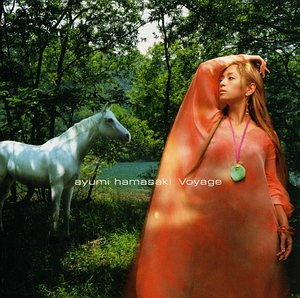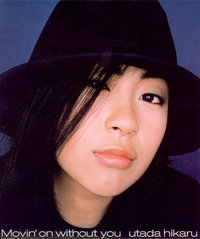
Speed is a 1994 American action thriller film directed by Jan de Bont in his feature directorial debut, with a screenplay by Graham Yost. The film stars Keanu Reeves, Dennis Hopper, and Sandra Bullock in lead roles, with Joe Morton and Jeff Daniels in supporting roles.

I Am... is the fourth studio album by Japanese recording artist Ayumi Hamasaki. It was released on January 1, 2002 by Avex Trax and was distributed throughout Asia in both physical and digital formats. Hamasaki enlisted long-time collaborator Max Matsuura to assist with the album's creation, and was inspired by the events of the September 11, 2001 attacks to emphasise lighter themes in contrast to her previous work.

Loveppears is the second studio album by Japanese singer Ayumi Hamasaki. It was released on November 10, 1999 by Avex Trax, ten months after her debut album, A Song for xx (1999). It was additionally distributed in a variety of formats and on different dates throughout Asia. Loveppears was written entirely by Hamasaki, produced by Max Matsuura, and includes collaborations with composers such as Hal, Dai Nagao, D.A.I, Yasuhiko Hoshino, and Kazuhito Kikuchi, among others. Musically, it is a departure from her previous record and incorporates more electronic and dance sounds with elements of trance, house, J-pop, and rock. Lyrically, it explores themes of love, frustration with life, loneliness, and individualism.

Rainbow is the fifth studio album by Japanese recording artist Ayumi Hamasaki, released on 18 December 2002 by Avex Trax. Production of Rainbow had commenced after the release of Hamasaki's fourth studio album I Am... that January; All lyrics were written by Hamasaki, and Japanese producer Max Matsuura returned to produce the album. The album was Hamasaki's first to feature conversational English lyrics, where in her previous works she had only used single words.

Memorial Address is the debut mini-album by Japanese singer Ayumi Hamasaki. Avex Trax released the album on December 17, 2003, in both physical and digital formats; it was her first album to be released in CD+DVD format in addition to the regular CD-only format, due to her increased interest in music video direction. The mini-album contains eight songs and features a number of collaborators, including Tetsuya Yukumi, Bounceback, CMJK, and Dai Nagao, among others, with Hamasaki serving as co-composer and songwriter. Memorial Address's musical influences include dance music, electronic, R&B, rock, and alternative metal.

Love Enhanced Single Collection is the second greatest hits album by Japanese singer Namie Amuro. It was released on March 13, 2002, through Avex Trax. This was Amuro's first greatest hits album in about four years, since 181920. It was also her first greatest hits album since her return to the music scene. Although the album is labeled as a "singles collection," nearly all of the songs on the album have been re-recorded, re-mixed, or re-arranged, all of which remain exclusive to this album's release. In addition, only "Lovin' It" was recorded as a single take. The album also contains the last of the work she created with her longtime creative partner Tetsuya Komuro.

"Voyage" is the 28th single released by Japanese singer Ayumi Hamasaki, serving as the third and final single for her fifth studio album, Rainbow (2002). It was released by Avex Trax in Japan and Hong Kong on September 26, 2002. The track was written by the singer herself, while the composition was done by the singer herself under the pseudonym Crea and Dai Nagao. Production was handled by long-time collaborator Max Matsuura. Musically, the song is a power ballad that lyrically describes the equality between women and men.

Japanese singer Ayumi Hamasaki has released eighteen studio albums, five compilation albums, twenty-six remix albums, four live albums and numerous singles and promotional singles. She debuted in 1995 under Nippon Columbia with the stage name Ayumi, releasing an extended play Nothing from Nothing, which was a collaboration with Dohzi-T and DJ Bass. Three years later, Hamasaki debuted again as a singer under Avex Trax with the single "Poker Face" (1998). Her first album A Song for ×× (1999) debuted at number one on Oricon's albums chart, and sold over 1.4 million copies.

"Movin' On Without You" is the second single by Japanese–American singer and producer Hikaru Utada. It serves as the second single from her debut studio album First Love (1999). The song was the first song that Utada had written and composed by herself. "Movin' On Without You" was incepted while Utada was attending high school in Tokyo, Japan, during 1997. Utada, who received a recording contract by Toshiba-EMI, had written an English-language version of the song, which remains unreleased to this day.

The discography of Japanese-American R&B and pop singer Hikaru Utada consists of eleven studio albums, four compilation albums, eleven video albums and numerous singles and promotional singles. Utada began as a musician in the early 1990s as a member of U3, a family unit made up of her, her mother Junko Utada, also known as 1970s enka singer Keiko Fuji, and her father, musical producer Teruzane Utada. U3 released their debut album Star in 1993, with the hope to debut in America. In 1996, the group was rebranded as Cubic U, an R&B project focusing on Hikaru Utada, resulting in the English language album Precious in 1998 with record label Toshiba EMI.

The solo discography of Ringo Sheena features eight studio albums, five compilation albums, two extended plays and twenty-seven singles. Signing with Toshiba-EMI in 1998, Sheena released her debut single "Kōfukuron" in May 1998, when she was 19 years old. She subsequently released the singles "Kabukichō no Joō" and "Koko de Kiss Shite", the latter becoming her first hit. As of 2014, Sheena has been signed with EMI Records following EMI Music Japan being absorbed into Universal Music Japan.

The discography of Japanese R&B singer Misia consists of nine studio albums, three compilation albums, one extended play (EP), one live album, six remix albums, twenty-six singles, twelve promotional singles, eighteen video albums and thirty-seven music videos. In 1997, Misia signed a recording contract with BMG Japan and joined the then up-and-coming talent agency, Rhythmedia. Under the sub-label Arista Japan, Misia released her first single, "Tsutsumikomu Yō ni..." in February 1998, followed by "Hi no Ataru Basho" in May. In June, her debut album, Mother Father Brother Sister, opened at number three on the Oricon chart. The album peaked at number one three weeks later and stayed in the top five for eleven consecutive weeks. Mother Father Brother Sister was certified double million and won a Japan Record Award for Best Album, as well as a Japan Gold Disc Award for Pop Album of the Year. In 2000, Misia's second studio album, Love Is the Message, debuted at number one and was certified double million. It won a Japan Record Award for Best Album and a Japan Gold Disc Award for Pop Album of the Year. The album spawned three top ten hits: "Believe," "Wasurenai Hibi" and "Sweetness." Misia's first remix album, Misia Remix 2000 Little Tokyo, was released three months later and shot to number one. It sold over 800,000 copies and is the second best-selling remix album of all time in Japan.
The discography of Japanese singer Mai Kuraki consists of fifteen studio albums, six compilation albums, twenty-three video albums, three remix albums, fifty-six singles, and sixteen promotional singles. Kuraki debuted in 1999, while she was still in high school, through Giza Studio. The label initially marketed Kuraki in the United States under the name Mai K, and released the single "Baby I Like" (1999). However, the single was a commercial failure which prompted the label to send her back to Japan. There, they released her single "Love, Day After Tomorrow", which peaked at number two on the Oricon Singles Chart and was certified million by the Recording Industry Association of Japan (RIAJ). The second single, "Stay by My Side" became her first number one single on the chart. Kuraki's debut album, Delicious Way, topped the Oricon Albums Chart and was certified triple million by the RIAJ.

The discography of Japanese musician Angela Aki consists of seven studio albums, two compilation albums, one extended play, thirteen singles, and five video albums. Her debut album, These Words, was released independently in the United States in early 2000 and was sung entirely in English. After returning to Japan in 2003, Aki followed this with a Japanese-language extended play, One, released under Virgo Music in 2005.

The discography of Japanese musician Chara consists of fifteen studio albums, four compilation albums, two live albums, three extended plays one soundtrack, eight video albums and fifty singles. Chara debuted as a musician in 1991 with Sony Music Entertainment Japan, and saw great success with the singles "Swallowtail Butterfly " (1996), the theme song for the film Swallowtail, and "Yasashii Kimochi" (1997). After releasing ten albums with the label, Chara left Sony in 2004 to become an independent musician, releasing the album Something Blue (2005). The next year, Chara signed her second major label contract with Universal Music Japan, releasing four albums between 2007 and 2011.

The discography of Japanese recording artist and actor Masaharu Fukuyama consists of ten studio albums, four compilation albums, three remix albums, twenty video albums, and numerous physical and promotional singles. Fukuyama debuted through BMG Japan by releasing the single "Tsuioku no Ame no Naka" (1990) and the album Dengon. The works failed to chart, however, in 1992 the single "Good Night", aided by the popularity it gained through use in the drama Ai wa Dō da, charted on the Oricon Singles Chart, peaking at number nine. In 1993, his album Calling became his first number one album on the Oricon Albums Chart; it has sold over 850,000 copies in Japan and has been certified two-times platinum by the Recording Industry Association of Japan (RIAJ).

"Jumping" is a song performed by South Korean girl group Kara from their debut Japanese album, Girl's Talk (2010) and their fourth EP, Jumping (2010). It was released on November 10, 2010, as the second Japanese single.
The discography of Japanese actress and singer-songwriter Takako Matsu includes ten studio, three compilation, two live, seven video albums, twenty-one singles, and twenty music videos. Born into a family of actors, Matsu made her debut as a stage performer before her roles in TV dramas and films. That year she released her first single, "Ashita, Haru ga Kitara", which peaked at number 8 on the Oricon Singles Chart and was certified platinum by the Recording Industry Association of Japan (RIAJ) for shipments of 400,000 copies. Matsu's debut album, Sora no Kagami, peaked at number 4 on the Oricon Albums Chart. Selling over 300,000 copies, it earned a platinum certification from the RIAJ and Matsu was named Best New Artist of the Year at the 12th Japan Gold Disc Awards.
The discography of Japanese singer Masayuki Suzuki includes 16 studio, 6 compilation, 4 cover albums, a live album, 10 video albums, and 36 singles. Inspired by Western R&B acts and doo-wop songs, Suzuki formed a band Chanels in 1975, along with his friends and released their debut single "Runaway". Chanels would later be renamed to Rats & Star. In 1986, Suzuki made his solo debut through Mother of Pearl.
The discography of Japanese boy band SMAP consists of 21 studio albums, 5 compilation albums, 23 video albums, and numerous singles. Sports Music Assemble People, abbreviated as SMAP, was formed in 1988 by a group of backup dancers for the boy band Hikaru Genji of Johnny & Associates. The band's initial releases performed poorly on the charts, but the following ones started gaining attention, aided by the group's appearance on their own variety show, SMAP×SMAP. Meanwhile Kimi Iro Omoi single was used in anime Akazukin Chacha broadcast in Japan only. In worldwide broadcast, Kimi Iro Omoi single was replaced by Shoko Sawada. However, that single can only available on MP3 Store, then download between TV Size and Full version. Their 2003 single "Sekai ni Hitotsu Dake no Hana" sold over two million copies in Japan, becoming one of the best-selling singles in the country. In August 2016, the group announced that they will disband by the year end. Since 2003, all of the band's releases have peaked at number one on the Oricon Albums or Singles Chart. The group has sold over 38,5 million records in Japan.













